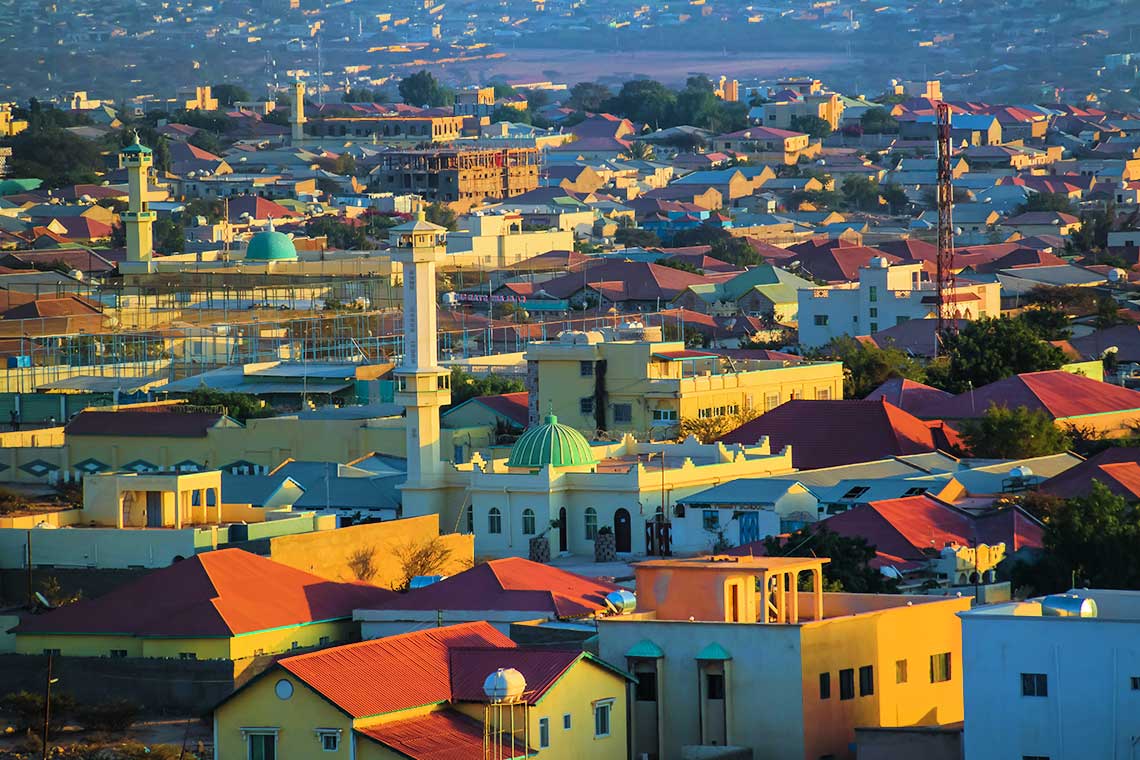Marktonderzoek in Somalië, Afrika

Somalia is an East African country that wraps around the Horn of Africa. As can be seen on the map, this pointy headland on the African continent stretches out into the Indian Ocean.
The country is flat and dry, with desert-like conditions. Many Somali people are still nomadic or semi-nomadic. As a result, they move from place to place, seeking arable land to raise cattle, camels, goats, and sheep. On the other hand, many Somalis are farmers.
This country has a long history influenced by both Africa and Arabia. It has one ethnic group, the Somali, but other empires ruled too. Italy and Britain were the last governing powers, arriving in the 1800 and 1900s. When these colonies merged, it caused lots of rivalry and disputes. Due to this, civil war broke out in 1991. Since then, there has been no actual central government.
Belangrijkste industrieën
The key exports are livestock, fish, and produce.
The economy is informal and runs without government mandate or checks. It’s also not taxed. In fact, a federal government body manages the country, assisted by different agencies.
This shaky governance and corruption jeopardize the progress of the country. Still, the economy is buoyant, and growing thanks to foreign companies. These overseas firms run outlets in the local Somali market. What’s more, they control these outlets remotely from more developed countries. Thus, they have access to resources like banks and a skilled workforce. They also get stable legal frameworks.
Buurten
Mogadishu is an important port city on the East African coast. Known to locals as “Xamar” or “Hamar,” it is the capital city. Somali and Arabic are the official languages. Yet, it is common to hear Swahili, English, and Italian in its busy streets. The city is lively, with many street markets, cafes, and grocery stores. It is a peaceful city, and locals feel safe shopping and living there.
People have lived and traded in this country for thousands of years. As a matter of fact, you can see the history in the cave art. Enjoy this art in places like the ancient Laas Geel cave complex, which shows the rich and early culture of the north coast region. Primeval pyramids called “taalo” also dot the landscape. These were once burial structures.
Trends
Foreign firms are eager to invest in this country. It has reserves of natural resources, such as uranium, iron ore, and natural gas. Foreign mining companies are seeking uranium deposits. The deposits in this country may be the largest in the world. So, this sector offers the chance for business growth for the country.
Another key point is that Arab countries are investing in livestock infrastructure. For instance, countries like the United Arab Emirates are purchasing large farms. These countries have a long history of trading with their African neighbors. They remain hopeful about the future growth Somalia promises.
Global trade is also on the rise, and the Somali business class is making an input to the rapidly growing economy.
The widespread violence and starvation in the 1990s pushed many to become refugees. More than a million Somali people have fled the country since 1991. They left to find a better life in other countries. As a result, the country now has a large diaspora, which takes an interest in its progress.The diaspora and the private sector are the lifelines of the nation.
Benefits and Strengths
Somalia is near the Arab Peninsula, and traders on both sides of the Persian Gulf take advantage of this strategic spot. Animals are one of the biggest exports, and they go to the Middle East. Somali livestock is high quality and sells at a great price.
Consumentenbasis
Nomadic clans make up a large part of the populace. Their lifestyle is very off-the-grid. They don’t have access to things like banking services and savings accounts. Instead, most money transactions happen via phone.
Somalis depend on funds sent from abroad as part of their income. In fact, many Somalis live below the poverty line.
Reasons to Grow Your Business in Somalia
The country’s economy is growing stronger. As it expands in the cities, more companies are opening. But, be warned: doing business will feel odd without government oversight. In fact, investors form part of the informal economy.
About Market Research in Somalia
There’s nothing like knowing exactly who your customers are. That’s why we provide market strategy research in Somalia. Our Qualitative and Quantitative Research delivers the data you need. We help you to expand your business. You can also use our Focus Groups to learn about opportunities in Somalia.
We also use interviews and surveys. These tools help you pinpoint the right place and time for entering the market. Companies can grow with the right research team. Contact us today to get started with your Somali investment.


